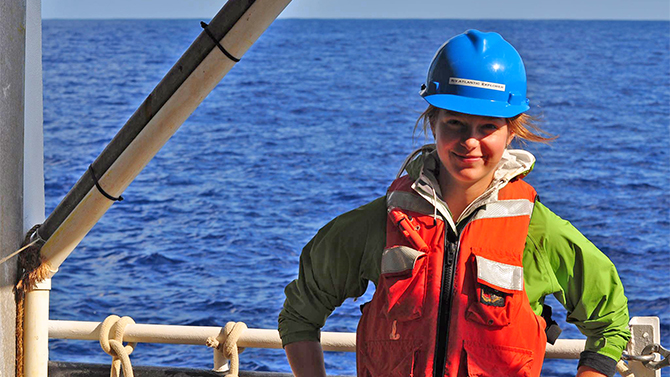


Grad student bound for Woods Hole
May 09, 2017
Oceanography student named post-doctoral scholar at Woods Hole Oceanographic Institution
University of Delaware doctoral candidate Veronique Oldham has been named a post-doctoral scholar at the Woods Hole Oceanographic Institution in Massachusetts.
It is a highly competitive opportunity awarded to only two individuals per year.
Oldham — who graduates later this month with her doctoral degree in oceanography — has been working to understand the cycling of trace elements in the environment.
She is advised by George Luther, Maxwell P. and Mildred H. Harrington Professor in the School of Marine Science and Policy, which is housed in the College of Earth, Ocean, and Environment.
“Veronique has demonstrated that she can tackle scientific questions to a successful conclusion with efficiency and creativity," said Luther, adding that her “superb work ethic” enabled her to finish her doctoral degree within four years.
Broadly, Oldham’s research focuses on how low levels of metals, specifically manganese, interact with the ocean environment. Dissolved metals are important in the ocean because they are micronutrients, which means they are required-in small quantities for the growth of most organisms.
Manganese, for example, is responsible for photosynthesis in most phytoplankton, microscopic plants that form the base of the marine food chain and generate much of the oxygen in the atmosphere.
Working under Luther’s supervision, Oldham has developed techniques to measure manganese in seawater based on the ability of its different compounds to absorb and emit light.
This work can help scientists gain a broader perspective on how metals interact with each other, and with other nutrients like nitrogen and phosphorous, and how these interactions affect the ocean's biological productivity.
Now, under the guidance of Collen Hansel and Max Saito at Woods Hole, Oldham will continue this work by exploring the biological processes that regulate trace metal distributions, particularly iron, cobalt and manganese.
The research unites two strands of biogeochemical inquiry: how changing oxygen reduction conditions will affect the development of trace metals in the ocean and what role natural organic compounds play in the way essential elements of living matter are circulated between the earth, air and land.
“Taken together, we have the techniques to explain the processes underlying the complex cycle of manganese in the ocean and to develop a comprehensive redox model for predictive purposes,” said Oldham.
In recommending her for the fellowship, Mark Moline, director of the School of Marine Science and Policy, called Oldham “a high achiever” who also is an excellent mentor.
“Veronique has demonstrated exceptional productivity, maturity and professionalism in a short period,” signaling a bright future ahead for Oldham, Moline said.
Oldham recently returned from a research cruise along the East Pacific Rise with Luther where she took a dive in the submersible Alvin to study manganese. Hear about the work from Oldham herself in this short video.
Contact Us
Have a UDaily story idea?
Contact us at ocm@udel.edu
Members of the press
Contact us at 302-831-NEWS or visit the Media Relations website

